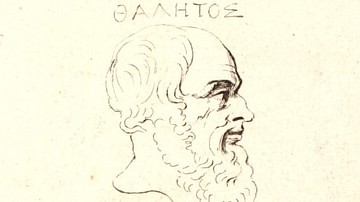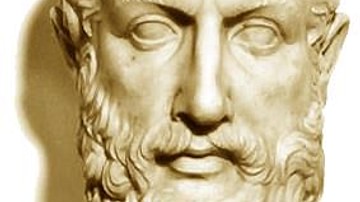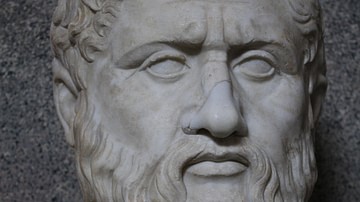
Anaximenes of Miletus (l. c. 546 BCE) was a younger contemporary of Anaximander and generally regarded as his student. Known as the Third Philosopher of the Milesian School after Thales (l. c. 585 BCE) and Anaximander (l. c. 610 - c. 546 BCE), Anaximenes proposed air as the First Cause from which all else comes.
In making this claim, Anaximenes differed from Thales, who claimed water was the source of all things, and Anaximander, who cited 'the boundless infinite'. To the Greeks of the time, 'air' was comparable to 'soul' and, just as one's breath gave an individual life, so air, Anaximenes claimed, gave life to all observable phenomena.
Almost nothing is known of Anaximenes' life except, as noted, that he was a contemporary and a student of Anaximander. According to Diogenes Laertius (3rd century CE), Anaximenes "wrote in the pure unmixed Ionian dialect. And he lived, according to the statements of Apollodorus, in the sixty-third Olympiad, and died about the time of the taking of Sardis [in 546 BCE]" (Baird, 12). The events of his life may be unknown but the effects of his theory on air as the First Cause were wide-reaching. Although he may seem, to a modern audience, to be making a claim he cannot prove, his attempt at such a proof provided an early model for the scientific method.
Thales & Anaximander
Anaximenes today forms the third part of the triad of Milesian philosophers who sought the basic 'stuff' from which the universe is made, the 'First Cause'. Their work would influence later Greek philosophers including Plato (l. 428/427-348/347 BCE) and Aristotle (l. 384-322 BCE). The Milesian philosophers departed from the traditional cultural understanding of their time that the universe was created by the gods and operated according to their will. To Thales, Anaximander, and Anaximenes, there was a simpler, and more rational, explanation for how the universe operated as it did. Their efforts to discover what that explanation might be laid the groundwork for the Greek philosophers who came after them.
Thales of Miletus claimed the First Cause was water and based this on three assumptions:
- The underlying explanation of the universe must be one, a unified element
- This unified element must be a “thing” – something observable
- This unified element must possess the ability to transform.
Water seemed the obvious choice because, when heated, it becomes steam and, when cooled, becomes ice. It was a single element, observable, and could change.
Anaximander agreed with Thales on there being a First Cause but rejected the claim that it was an observable element. Instead of water, Anaximander argued, all of existence came from, and operated because of, the apeiron defined as "the unlimited, boundless, infinite, or indefinite" (Baird, 10). Exactly what this 'aperion' was is unknown because all that exists of Anaximander's work is fragments quoted by later writers. Even so, he advanced Thales' claim that the underlying explanation of the universe must be a single, unified “thing”, he simply raised that “thing” from observable to invisible and seems to have claimed that, although one could not see it, one could recognize its existence by observable phenomena.
The aperion, a kind of void-which-not-a-void, caused all things to come into being and vanish away by a constant clashing of opposites – cold and hot, wet and dry, low and high – and this can be observed through the changeable nature of the elements and human life. Water puts out fire, but fire also dries out what is wet, and that which goes up into the air also comes down. The elements of earth, air, fire, and water could not, themselves, be the First Cause because they were all obviously operated on and given their characteristics by something else. Water could not decide on its own that it would not be dried by fire nor could fire resist being put out by water. The First Cause, then, was an underlying force which caused everything to happen as it was seen to happen.
Anaximenes' First Cause
The problem with Anaximander's theory was that it was far from clear (philosophers and philosophy students still struggle with the concept in the present day) and so Anaximenes sought to simplify the First Cause by trying to prove that it was air. Professor Forrest E. Baird comments:
Anaximenes proposed air as the basic world principle. While at first his thesis may seem a step backwards from the more comprehensive (like Anaximander's unlimited) to the less comprehensive particular (like Thales' water), Anaximenes added an important point. He explained a process by which the underlying one (air) becomes the observable many: By rarefaction, air becomes fire, and, by condensation, air becomes, successively, wind, water, and earth. Observable qualitative differences (fire, wind, water, earth) are the result of quantitative changes, that is, of how densely packed is the basic principle. This view is still held by scientists. (12)
Anaximenes explained the process by which the First Cause creates the observable world in this way:
Air differs in essence in accordance with its rarity or density. When it is thinned it becomes fire, while when it is condensed it becomes wind, then cloud, when still more condensed it becomes water, then earth, then stones. Everything else comes from these. (DK13A5)
To Anaximenes, everything was in a constant state of change owing to the property of air and how it is always in flux. The world itself, he claimed, was created by air through a process he compared to the process of felting, by which wool is compressed to create felt. In this same way was the earth created through compression of air which, through a process of evaporation, gave birth to the stars and the planets. All of life came from this same sort of process, of air being compacted to change itself, or another, into a different thing.
Following Anaximander, Anaximenes claimed that the interaction of observable opposites proved air as the First Cause. Scholar Daniel W. Graham notes:
Using two contrary processes of rarefaction and condensation, Anaximenes explains how air is part of a series of changes. Fire turns to air, air to wind, wind to cloud, cloud to water, water to earth and earth to stone. Matter can travel this path by being condensed, or the reverse path from stones to fire by being successively more rarefied. Anaximenes provides a crude kind of empirical support by appealing to a simple experiment: if one blows on one's hand with the mouth relaxed, the air is hot; if one blows with pursed lips, the air is cold (DK13B1). Hence, according to Anaximenes we see that rarity is correlated with heat (as in fire), and density with coldness, (as in the denser stuffs). (3)
In this way, Anaximenes provided a basis for rational discourse and debate on his claim and laid the groundwork for future scientific inquiry into the nature of existence.
Air as God
Like Thales and Anaximander before him, Anaximenes sought an underlying reason for existence and natural phenomena without appealing to the tradition of supernatural deities as the First Cause but, even so, did not deny the existence of gods. Instead of the gods creating air, along with the other elements, he claimed, air had generated the gods. If this claim is accepted then what, precisely, the gods did is unclear. If the world operated through a succession of rarefaction and condensation, and if this process explained the workings of the universe as a whole, there seems no place in it for supernatural deities.
It seems, however, from the work of later writers, that Anaximenes did find a place for the gods in his theory – what that place was, unfortunately, is unknown. St. Augustine of Hippo (l. 354-430 CE), in his City of God, notes that Anaximenes "did not deny that there were gods, or pass over them in silence; yet he believed not that the air was made by them but rather that they arose from the air" (VIII.ii). Augustine does not elaborate on what a deity's function was after it had so arisen in Anaximenes' worldview.
If, however, one interprets Anaximenes' 'air' as an early precursor to Aristotle's Prime Mover, one can find room for gods or a single god. The Prime Mover, according to Aristotle, is the fixed, unchanging source of all that exists, the seen and unseen. In the same way, Anaximenes' air is simply that which causes all else to be but deities might still operate within that process to regulate it. Still, this view does not seem to fit with the fragments of his work quoted by later writers.
Even though, like the other Milesians, he is never quoted as teaching atheism, there is nothing theistic in any of the extant fragments of his writings nor in any of the references to him by ancient writers. Cicero (l. 106-43 BCE), in his On Nature, notes that "Anaximenes determined that air is a god and that it comes into being and is measureless and infinite and always in motion" (Baird, 13). This statement reflects a philosophy more in keeping with Anaximander's aperion, a worldview which also seems to have had no room in it for gods.
Legacy
Anaximenes' influence was far-reaching and a number of later philosophers took his work as the basis for their own theories on the First Cause. Graham comments:
Anaximenes' theory of successive change of matter by rarefaction and condensation was influential in later theories. It is developed by Heraclitus (DK22B31), and criticized by Parmenides (DK28B8.23-24, 47-48). Anaximenes' general theory of how the materials of the world arise is adopted by Anaxagoras (DK59B16), even though the latter has a very different theory of matter. Both Melissus (DK30B8.3) and Plato (Timaeus 49b-c) see Anaximenes' theory as providing a common-sense explanation of change. Diogenes of Apollonia makes air the basis of his explicitly monistic theory. The Hippocratic treatise On Breath uses air as the central concept in a theory of diseases. By providing cosmological accounts with a theory of change, Anaximenes separated them from the realm of mere speculation and made them, at least in conception, scientific theories capable of testing. (3)
His influence is especially noticeable in the philosophy of the later writer Heraclitus, as noted above, who developed the concept of Flux as a First Cause in and of itself. To Heraclitus, the clash of opposites was the driving life force. In this, Heraclitus unified the Milesian philosophers' theories with Anaximenes as his starting point: like rarefaction and condensation, Flux (change) was observable; like the aperion, it was indefinite and seemingly eternal; and like water, it was unified – always possessing of the same characteristic.
This same basic concept informed the philosophy of Heraclitus' predecessor Pythagoras (l. c. 571 - c. 497 BCE) who claimed that life was an eternal series of transformations between the earthly and immortal states as the soul made its way toward understanding and wholeness through life, death, and reincarnation in various forms. Although Pythagoras was older than Anaximenes, they were contemporaries and it is unknown at what age Pythagoras began his philosophical inquiries. The possibility that Pythagoras was influenced by the work of Anaximenes, therefore, is likely. The theories of Heraclitus, and especially of Pythagoras, would influence the vision of Plato whose philosophy then informed virtually every other philosopher, in one way or another, who came after him.
(Author's Note: Citations DK reference the Diels/Krantz categorization used in Freeman's The Fragments of the Pre-Socratics).






